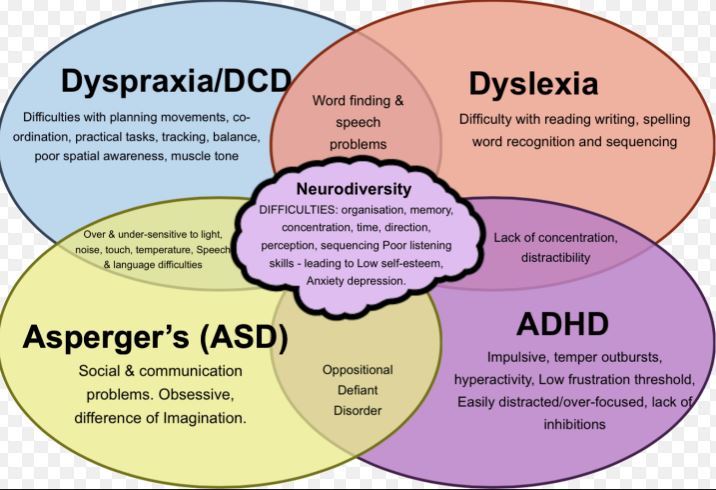As said in previous articles, dancing is an extraordinary job for extraordinary women. The job often requires the personality type that is fearless, open minded, creative, charismatic, independent, thick skinned and able to adapt and overcome. All of these traits appear in a certain subset of people. That is neuroatypical human beings, more specifically, those with ADHD and Autism, two overlapping and very misunderstood conditions. For the benefit of the reader, neuroatypical refers to neurodiverse individuals as opposed to neurotypical ie those without these conditions. By no means is this article insinuating that all dancers have a sensory issue. The industry has a whole wealth and spectrum of characters after all. This article is more exploring the benefits and problems the can occur for dancers with these conditions and how the traits can lead individuals into the industry and take them into their comfort zone.
What are ADHD and ASD?
ADHD (attention deficit hyperactivity disorder) and ASD (autistic spectrum disorder) are both conditions that affect sensory processing and executive function. Whilst having overlaps, they are distinct from one another. However, these conditions can be co-morbid, meaning many people can have both together.

Why stripping can be appealing
As illustrated by the table above, there are many symptoms that are incredibly common between ADHD and ASD. It isn’t hard to see how dancing can lend itself to these conditions. The major difficulties include organisation, memory, time keeping and taking directions. Stripping is a self employed profession with a large amount of flexibility. It is not hard to see how it could work.
Some clubs allow dancers to turn up whenever they want and even those with minimum terms can run to a maximum of 2-3 months. Many will make no issue of a dancer turning up 3 hours late as long as she is willing to pay the surcharge. Many will hardly even notice if a dancer books in and decides to not turn up because she doesn’t feel like it that day. Similarly, if the situation is getting overwhelming and a dancer is feeling overstimulated, there are often no restrictions on taking time out and getting some space in the changing rooms. Finally, if a dancer has an outburst at a customer or impulsively answers back, it’s no big deal and sass is almost expected from strippers. Unlike most other customer service orientated industries.
Why neurodiversity works with stripping
Neuroatypical individuals are used to not totally fitting in. Therefore, it isn’t a stretch to realise that pursuing a job that is outside societal norms would be completely unsurprising. Neurodiverse people think outside the box regularly. They are also very used to being misunderstood. Those that don’t know any different often judge. Consequently, the stigma attached to stripping is a version of ‘same shit, different day’. When you are used to having to brush off ignorance, it’s really not hard to apply this skill to other areas of life. Some sufferers of these condition are firm in their belief that their conditions actually enhance their ability to do the jobs as opposed to hinder, which is the norm in their day to day lives. In the article entitled, ‘The secret life of an autistic stripper‘ by Reese Piper she speaks about overstimulation,
Central to autism is a difficulty experiencing life in real time. Many autistic people can’t filter out information, which makes it difficult to zone in and focus. All those years, I couldn’t read people’s cues because I struggled to cancel out the world around me. At my sister’s house, the background music, the forks scraping on plates, the blue walls, all swam in front of people’s facial expressions.
‘The Secret Life of an Autistic Stripper’ by Reese Piper
But in the private rooms at the club, there were no outside stimuli. The rules were clear, the distractions minimal, so I could focus and interact.
The ‘otherness’ of the neurodiverse makes them very charimatic individuals. They have very unique personalities and people pick up on this even if they can’t put their finger on what is so fascinating. Consequently, in a job where it is important and a benefit to stick out and be different, it can be incredibly rewarding.
Symptoms and club styles
Whilst there are many positives to dancing with neurodiversity, there are also pitfalls and downsides. Nightclubs in general are full of stimulus. Loud music, flashing lights, drunk patrons and in strip clubs, dancers hustling, performing, gossiping and, occasionally, arguing. There really is a lot going on. As previously mentioned, taking time out when its getting too much is important. It is better to take a minute to recollect than try and plough through and inevitably make the situation worse. Self care needs to be number one.
For some dancers, rethinking their club or days they work can be hugely beneficial. Weekdays tend to be calmer and quieter but the clientele of better quality. Some clubs operate like full blown nightclubs. You require little conversation to be able to work them. Converselt, you get others where the intensity can be unleashed with more one on one sales techniques. Trial and error is the best way to figure out what works for you and your particular set of symptoms. There is an extensive list of strip clubs in different areas here.
Further ways to make it work
If eye contact is difficult for you, focus on their nose or forehead. It gives the impression of looking at their eyes, especially in a dark club. Awkward situations can turn out to be interesting so don’t feel bad if it takes strange turn.
Medication can be life changing. It is a very personal choice and definitely isn’t for everyone, however. If it is for you, be open with your healthcare professional about hours and requirements at work. Even if you don’t go into full specifics about your profession. Doctors tend to work on the basis of a 9-5 job. The antisocial hours will affect optimum dosage and timings. Figuring out the right balance can significantly improve your work life and earning ability.
If you are working with agencies then communicate your particular needs. There are agents out there that can totally relate to your set of circumstances! Even if they can’t, a good agent will take on board your requirements and react to place you accordingly.
Finally, and most importantly, see your differences as a superpower. In a world of striving to be ‘normal’, embrace the weird. You are unique, inspiring and totally got this!

